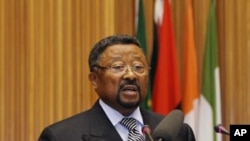The race for the chairmanship of the African Union Commission ended Monday in a deadlock, as the incumbent chairman, Jean Ping, andf challenger Nkosazana Dlamini-Zuma failed to win the necessary two-thirds majority needed to win.
Through three tense rounds of voting, the contest was tight. Jean Ping, the incumbent from Gabon, narrowly prevailed in the first ballot, 28 votes to 25. The challenger, veteran South African anti-apartheid activist Nkosazana Dlamini-Zuma, pulled ahead slightly in the second round, 27-26, but in the third round, Ping was back on top, 29 to 23.
According to the rules, Ping's name was on the ballot alone in a fourth round, but 20 countries abstained, leaving him short of the necessary two-thirds majority and sending the race into confusion. Diplomats said the mass abstention was a vote of no confidence in Ping's leadership, which many say was disastrous during recent continental crises in Ivory Coast and Libya.
It was not immediately clear how the stalemate would be resolved. The 53 member nations went into several hours of closed-door negotiations in search of a compromise.
Diplomats close to the negotiations say a possible deal would allow Ping to stay on as chairman for another six months, until a fresh election is held at the next continental summit in Malawi at the end of June.
A committee was formed to set election rules and solicit other candidates. Diplomats say the committee will also decide whether Ping or Zuma would be allowed to run in that election. Sources close to both candidates indicate they probably would stand aside and let others run.
South African Foreign Minister Maite Nkoana Mashabane cast the outcome as a victory, saying it had succeeded in ousting Ping, who has been blamed for the organization's slow and weak response to the recent crises in Libya and Ivory Coast.
"The outcome is that the incumbent chair lost, and in terms of the rules he had to vacate the seat, and in his place will come the deputy chair ad interim until the next elections, which by all probability will be at the next summit in June-July, Nkoana-Mashabane said. "After four rounds of elections, we think the political message that has been sent out there is that African leaders want change."
The deadlock is a setback for efforts to paint a picture of continental unity, and revealed a glaring split along language lines. Ping represents the French-speaking bloc of countries that carefully guard their hold on the leadership. But South Africa represents a bloc that is increasingly disenchanted with the pace of change.
The situation has also dampened the celebration at the new African Union headquarters, which was dedicated Saturday. It is also the first summit since the death of former Libyan leader Moammar Gadhafi, who was a powerful force in the continental organization for four decades, and held the rotating AU chairmanship in 2009.












